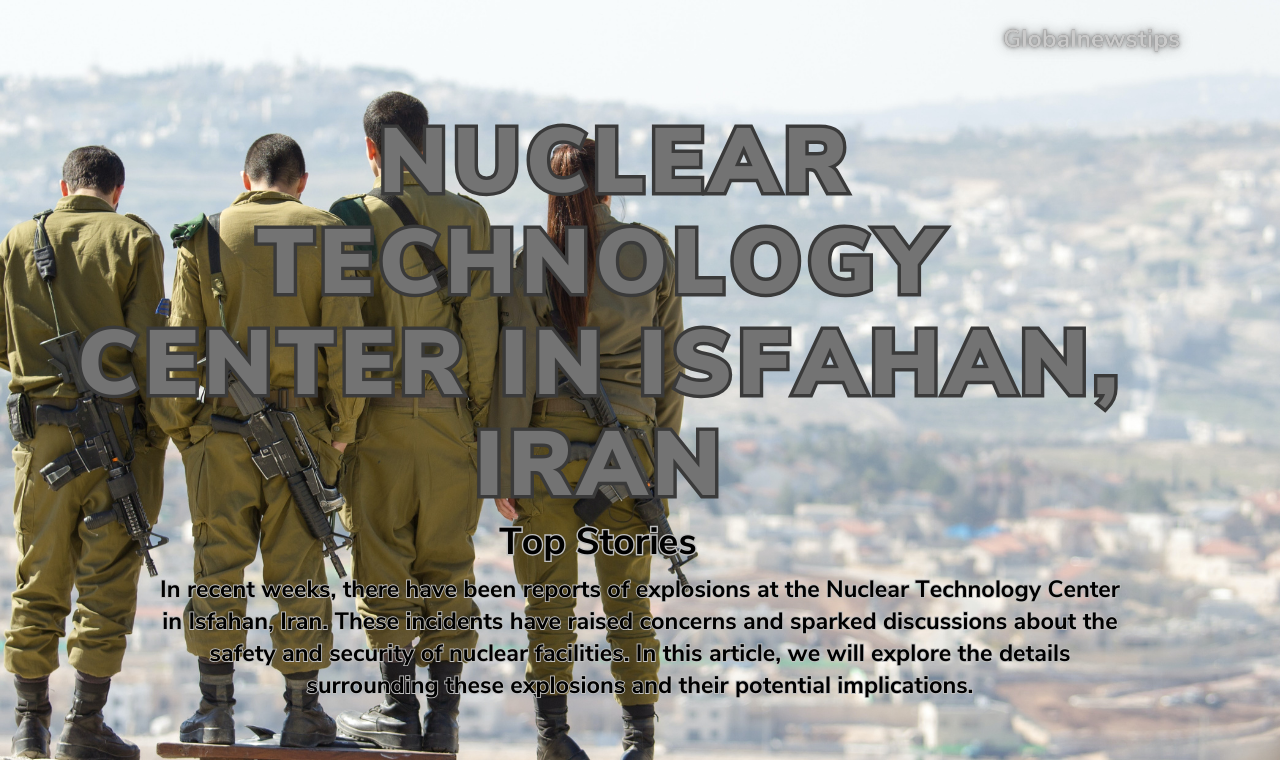Introduction
In recent weeks, there have been reports of explosions at the Nuclear Technology Center in Isfahan, Iran. These incidents have raised concerns and sparked discussions about the safety and security of nuclear facilities. In this article, we will explore the details surrounding these explosions and their potential implications.
The Explosions
The first explosion occurred on [date] at the Nuclear Technology Center in Isfahan. According to official statements, the explosion was the result of a technical malfunction during routine maintenance. The incident caused significant damage to the facility, but no casualties were reported.
Shortly after the first explosion, a second explosion occurred on [date]. This time, reports suggest that the explosion was caused by a cyberattack, leading to speculation about potential sabotage. The exact nature and extent of the damage from this incident are still being investigated.
Implications and Concerns
These explosions have raised concerns about the safety protocols and security measures in place at nuclear facilities. The incidents highlight the potential risks associated with nuclear technology and the importance of robust safety measures to prevent accidents or intentional acts of sabotage.
Furthermore, the explosions have renewed debates about Iran's nuclear program and its compliance with international agreements. Critics argue that these incidents demonstrate the need for stricter monitoring and verification of Iran's nuclear activities.
The Importance of Nuclear Safety and Security
Nuclear safety and security are critical concerns for countries that possess or are seeking to develop nuclear capabilities. The potential risks associated with nuclear energy and weapons necessitate robust measures to ensure the safe and secure handling of nuclear materials and facilities.
One country that has been under scrutiny in recent years regarding its nuclear program is Iran. The implications of Iran's nuclear activities extend beyond its borders, impacting regional and global security. It is essential to examine the implications of nuclear safety and security in Iran and the broader implications for the international community.
The Iran Nuclear Deal
In 2015, Iran reached a landmark agreement with the United States, the United Kingdom, France, Germany, Russia, and China, collectively known as the P5+1. The Joint Comprehensive Plan of Action (JCPOA) aimed to limit Iran's nuclear program in exchange for the lifting of economic sanctions.
The JCPOA included provisions for enhanced monitoring and verification measures to ensure Iran's compliance with its nuclear obligations. These measures were essential for addressing concerns about Iran's nuclear activities and reducing the risk of proliferation.
Implications for Nuclear Safety
One of the primary implications for nuclear safety in Iran is the need for effective regulatory oversight and robust safety protocols. As Iran expands its nuclear capabilities, it must prioritize the safety of its nuclear facilities and ensure that they meet international standards.
International cooperation and assistance can play a vital role in enhancing nuclear safety in Iran. Countries with advanced nuclear programs can share their expertise and provide technical support to help Iran develop and implement stringent safety measures.
Moreover, transparency is crucial for nuclear safety. Iran should maintain open lines of communication with the International Atomic Energy Agency (IAEA) and other relevant international bodies, providing regular updates on its nuclear activities and allowing for inspections to verify compliance.
Implications for Nuclear Security
The implications for nuclear security in Iran are significant, given the potential for illicit proliferation and the risk of terrorist organizations gaining access to nuclear materials. Preventing unauthorized access to nuclear facilities and ensuring the protection of nuclear materials is of utmost importance.
Iran must establish comprehensive security measures to safeguard its nuclear facilities from external threats and internal sabotage. This includes implementing physical security measures, such as secure perimeters, surveillance systems, and access controls.
Furthermore, international cooperation is essential for addressing the broader implications of nuclear security. Countries must collaborate to prevent the illicit trafficking of nuclear materials and strengthen border controls to detect and intercept any attempts at smuggling.
The Broader Implications for the International Community
Iran's nuclear program has broader implications for the international community, particularly in terms of non-proliferation efforts. The success or failure of the Iran nuclear deal has implications for future negotiations with other countries seeking nuclear capabilities.
If the international community can effectively address the nuclear safety and security concerns in Iran, it will set a precedent for future agreements and strengthen the global non-proliferation regime. Conversely, failure to address these concerns could undermine trust and hinder future diplomatic efforts.
Conclusion
The explosions at the Nuclear Technology Center in Isfahan, Iran, have brought attention to the safety and security of nuclear facilities. While investigations are still ongoing, these incidents serve as a reminder of the potential risks associated with nuclear technology. It is crucial for countries with nuclear programs to prioritize safety and security to prevent accidents and maintain international trust.








